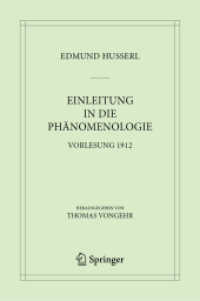Full Description
Popular Education is a concept with many meanings. With the rise of national systems of education at the beginning of the nineteenth-century, it was related to the socially inclusive concept of citizenship coined by privileged members with vested interests in the urban society that could only be achieved by educating the common people, or in other words, the uncontrollable masses that had nothing to lose. In the twentieth-century, Popular Education became another word for initiatives taken by religious and socialist groups for educating working-class adults, and women. However, in the course of the twentieth-century, the meaning of the term shifted towards empowerment and the education of the oppressed. This book explores the several ways in which Popular Education has been theoretically and empirically defined, in several regions of the world, over the last three centuries. It is the result of work by scholars from Europe and the Americas during the 31st session of the International Standing Conference on the History of Education (ISCHE) that was organised at Utrecht University, the Netherlands in August 2009.
This book was originally published as a special issue of Paedagogica Historica.
Contents
Introduction: The people, the poor, and the oppressed: the concept of popular education through time 1. The concept of popular education revisited - or what do we talk about when we speak of popular education 2. Popular education and the logics of schooling 3. La Genese du concept d'éducation publique au Portugal et au Brésil 4. Schooling as a means of popular education: Pestalozzi's method as a popular education experiment 5. Education of poor children as an answer to a social and economic crisis: Dutch local government policies in the eighteenth century 6. Poverty, education and gender: pedagogic transformations in the schools for the poor (Armenschulwesen) in Hamburg, 1788-1871 7. Popular education - rights and duties: school reforms in the Sardinian Kingdom between the eighteenth and nineteenth centuries 8. Popular education and republican ideals: the Portuguese lay missions in colonial Africa, 1917-1927 9. Nursery schools for the few or the many? Childhood, education and the State in mid-twentieth-century England 10. "I promised them that I would tell England about them": a woman teacher activist's life in popular humanitarian education 11. The American role in education in the Middle East: ideology and experiment, 1920-1940 12. The New Education Fellowship and UNESCO's programme of fundamental education 13. The Educational Missions under the Second Republic in Spain (1931-1936): a framework for popular education 14. Exploring new concepts of popular education: politics, religion and citizenship in the suburban schools of Madrid, 1940-1975







